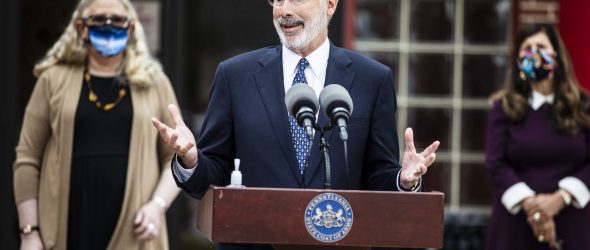Gov. Tom Wolf introduced a broad legislative agenda for the fall, including expanded access to child care, paid family leave for Pennsylvanians, recreational marijuana sales and a host of other items.
The governor is asking lawmakers to change the law to allow sales of marijuana for recreational purposes, going beyond sales of medical marijuana. He’s also seeking more than $300 million in grants and loans for small businesses and tax breaks for the hospitality industry.
Wolf announced a lengthy list of proposals to help the state recover from the coronavirus pandemic and the ensuing economic damage to families and the commonwealth. More than 129,000 people have been infected and more than 7,500 people have died. Many businesses have shuttered or had to cut staff, with the state’s unemployment rate rising to 13.7 percent last month.
The Democratic governor’s list of proposals is hardly guaranteed passage. Republicans control both chambers of the General Assembly and will likely weigh the costs of some of the proposals with scrutiny. Wolf urged lawmakers to get behind his plans, saying they will help families and the state’s business community.
“House and Senate Democrats have been fighting for progress to protect families and businesses in these spaces since the beginning of the pandemic, but they have been stopped at every turn by the Republican majority focused on ignoring the public health crisis,” Wolf said in a statement. “That must stop now.”
The governor released his proposals just before a press conference in Middletown Tuesday morning.
House Majority Kerry Benninghoff, R-Centre, didn’t embrace the governor’s proposal.
“Gov. Wolf has spent the last six months turning his back on the people’s representatives in the General Assembly despite our numerous attempts to work with him to fight this pandemic,” Benninghoff said in a statement. “It is disingenuous for this governor to put forward an unaffordable legislative agenda and require taxpayers to bail him out of his unilateral mandates that have devastated their lives and livelihoods.”
Here are some highlights of Wolf’s proposals for the fall, according to the Wolf administration.
Hazard pay: Wolf is seeking $225 million to increase hazard pay to Pennsylvania workers. The Wolf administration said this funding would cover a $3-per-hour increase for 208,000 frontline workers across the commonwealth
More access to child care: The governor wants more money to help families pay for child care. He’s seeking $250 million for families seeking child care due to remote instruction or hybrid models, with kids only attending in-person classes on some days. Wolf wants another $27 million to expand child care options in places where there are few providers currently. The governor also is looking for $50 million in grants to part-day programs serving kids in low-income communities to help provide remote learning for school districts not returning to in-person instruction.
Paid parental leave: Wolf plans to offer six weeks of paid leave to all state employees who have been working for the commonwealth for a year or more. Wolf is also asking lawmakers to approve paid family leave for all workers.
Legalize marijuana: Wolf is asking the legislature to allow the sales of recreational marijuana. The governor proposes using the proceeds to support existing small business grant funding. Lt. Gov. John Fetterman has been an ardent supporter of legalizing marijuana to generate revenue for the state. Wolf signed the bill allowing sales of medical marijuana in 2016. Wolf said he hopes lawmakers will get behind allowing sales of pot, given the economic damage from the pandemic.
Personal protection equipment: The governor is proposing $10 million for a PPE Reimbursement Program for employers “to cover the cost of masks, face shields, cleaning supplies and hand sanitizers,” among other items.
Nix alcohol tax: Wolf is asking lawmakers to pass legislation to aid restaurants and hotels. Wolf wants to cancel or reduce the alcohol tax for the hospitality industry, allowing businesses to buy boze at or near cost for six months.
Grants and loans for businesses: The governor is proposing $225 million in forgivable loans and grants to small businesses through the COVID-19 Relief Statewide Small Business Assistance Program. Wolf is also seeking an additional $100 million in loans and grants for the hospitality, leisure, and service industries, including restaurants and bars, salons, and barber shops.
Housing help: Wolf is seeking $100 million to offer financial assistance to renters of low-to-moderate incomes who are having trouble paying their rent. Wolf wants to expand the PA Housing Finance Agency CARES Rent Relief Program. The assistance would continue to be paid in grants directly to property owners and landlords.
Utilities: Wolf wants $100 million in grants to help residents pay for electric, water and gas service. The Pennsylvania Utility Commission has issued a moratorium on the suspension of service during the pandemic; Wolf is seeking grants to help low-income residents pay their utility bills when the moratorium is listed.
Gift ban: The governor has barred members of his administration from accepting gifts. Wolf is pushing for a ban for all public officials. The Wolf administration said only 10 states lack a gift ban for all public officials.
Election: Wolf wants lawmakers to allow counties to count election ballots up to three days after the election, as long as the ballot is postmarked by Election Day. He also is seeking to allow the pre-canvassing of ballots 21 days before the election. Republican lawmakers have said they support allowing counties to have more places to return ballots but want an earlier cut-off date to request a mail-in ballot.
Thanks for visiting PennLive. Quality local journalism has never been more important. We need your support. Not a subscriber yet? Please consider supporting our work.
More from PennLive
Pa.‘s Senate GOP leaders propose an earlier cut-off date for voters to request a mail-in ballot
If a student tests positive for COVID-19, here’s what schools will do and what parents should know
Hundreds of well-paying, high-demand jobs need to be filled yearly in central Pa., state says


